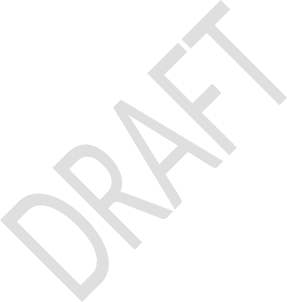Instrument 10: Baseline teacher reports to questions about children in classroom
OPRE Study: Variations in Implementation of Quality Interventions (VIQI) [Pilot, Impact, Process Studies]
Instrument 10 Baseline Teacher Reports to Questions about Children CLEAN
Instrument 10: Baseline teacher reports to questions about children in classroom
OMB: 0970-0508
V IQI
Baseline Teacher Report on Children
IQI
Baseline Teacher Report on Children
July 2021

BASELINE TEACHER REPORTS TO QUESTIONS ABOUT CHILDREN IN CLASSROOM
The purpose of the Baseline Teacher Report on Children is to capture children’s social and behavioral outcomes (i.e., positive social behaviors, challenging behaviors, and approaches to learning) based on teacher observation and interaction during routine classroom activities at the beginning (baseline) of the impact evaluation and process study. Lead teachers will be asked to complete a report on selected children in their classroom. This will be handed out at about the same time as the baseline teacher survey.
Introduction
Thank you for participating in the Variations in Implementation of Quality Interventions (VIQI) Project! As part of this study, we would like you to answer some questions about some children in your classroom. This information is crucial to helping us understand the impacts of early care and education centers on children.
Your participation is completely voluntary, and you may skip any questions you do not wish to answer. You may stop the survey at any time. Your responses to these questions will be kept private to the extent permitted by law and will not be shared with your supervisor or other staff. There are no direct benefits to you for participating. Participation does not involve any risks other than what you would encounter in daily life. There is a small risk that your information could be lost, stolen, or misused, even though we follow strict rules to protect your information. The study team will follow strict procedures to protect your responses, and your responses will only be used for research and program improvement purposes. Your responses will be stored in password protected computer files and in locked research facilities. The data will be used only by the research team and other researchers bound by the same security requirements described here. We also may share de-identified responses with researchers looking at other education research topics who agree that they will protect your information.
Please complete this questionnaire within the next [X] days. Once complete, please send it back to [ADDRESS]. It will take approximately 10 minutes per child to complete. If you have any questions, please contact your project liaison at [PHONE] or [email].
Thank you!
An agency may not conduct or sponsor, and a person is not required to respond to, a collection of information unless it displays a currently valid OMB control number. The OMB number for this information collection is 0970-0508 and the expiration date is XX/XX/XXXX. Send comments regarding this burden estimate or any other aspect of this collection of information, including suggestions for reducing this burden to [Contractor Contact Name]; [Contractor Contact Address]
ITEMS ABOUT CHILDREN’S POSITIVE SOCIAL SKILLS
How well do you know [child name]?
Not well
Moderately well
Very well
I have known [child name] for _____ months.
How often does this child attend school?
This child has nearly perfect attendance
This child is sometimes absent
This child misses many days
Please rate each of the listed behaviors according to how well it describes [CHILD NAME].
Prosocial Behavior Subscale from the Social Competence Scale (CPPRG, 1995) |
Almost Never |
Rarely |
Sometimes |
Often |
Very Often |
Almost Always |
Shares with others |
□1 |
□2 |
□3 |
□4 |
□5 |
□6 |
Is helpful to others |
□1 |
□2 |
□3 |
□4 |
□5 |
□6 |
Resolves problems with other children on his or her own |
□1 |
□2 |
□3 |
□4 |
□5 |
□6 |
Listens to other people’s point of view |
□1 |
□2 |
□3 |
□4 |
□5 |
□6 |
Cooperates |
□1 |
□2 |
□3 |
□4 |
□5 |
□6 |
Understands other people’s feelings |
□1 |
□2 |
□3 |
□4 |
□5 |
□6 |
Expresses needs and feelings appropriately |
□1 |
□2 |
□3 |
□4 |
□5 |
□6 |
Emotion Regulation Subscale from the Social Competence Scale (CPPRG, 1995) |
|
|
|
|
|
|
Copes well with disappointment or frustration |
□1 |
□2 |
□3 |
□4 |
□5 |
□6 |
Accepts things not going his or her way |
□1 |
□2 |
□3 |
□4 |
□5 |
□6 |
Feelings are easily hurt (R) |
□1 |
□2 |
□3 |
□4 |
□5 |
□6 |
Whines or complains (R) |
□1 |
□2 |
□3 |
□4 |
□5 |
□6 |
Controls temper when there is a disagreement |
□1 |
□2 |
□3 |
□4 |
□5 |
□6 |
Stops and calms down when frustrated or upset |
□1 |
□2 |
□3 |
□4 |
□5 |
□6 |
PLACEHOLDERS FOR ITEMS ABOUT CHILDREN’S CHALLENGING BEHAVIORS
Please rate the frequency that [child name] shows each behavior.
Aggressive/Oppositional Items from the Teacher Observation of Child Adaptation-Revised (TOCA-R) (Werthamer-Larsson, Kellam, & Wheeler, 1991) |
Almost Never |
Rarely |
Sometimes |
Often |
Very Often |
Almost Always |
Breaks things on purpose |
□1 |
□2 |
□3 |
□4 |
□5 |
□6 |
Stubborn |
□1 |
□2 |
□3 |
□4 |
□5 |
□6 |
Yells at others |
□1 |
□2 |
□3 |
□4 |
□5 |
□6 |
Knowingly breaks rules |
□1 |
□2 |
□3 |
□4 |
□5 |
□6 |
Fights with other children |
□1 |
□2 |
□3 |
□4 |
□5 |
□6 |
Ignores or refuses to obey adults |
□1 |
□2 |
□3 |
□4 |
□5 |
□6 |
Hits, pushes or shoves |
□1 |
□2 |
□3 |
□4 |
□5 |
□6 |
Internalizing/Withdrawn Items (from TOCA-R and other behavior problem scales developed for young children) |
|
|
|
|
|
|
Invites others to play (R) |
□1 |
□2 |
□3 |
□4 |
□5 |
□6 |
Low energy, lethargic or inactive |
□1 |
□2 |
□3 |
□4 |
□5 |
□6 |
Keeps to him or herself, tends to withdraw |
□1 |
□2 |
□3 |
□4 |
□5 |
□6 |
Sad, unhappy |
□1 |
□2 |
□3 |
□4 |
□5 |
□6 |
Avoids playing with other children |
□1 |
□2 |
□3 |
□4 |
□5 |
□6 |
Act younger than his or her age |
□1 |
□2 |
□3 |
□4 |
□5 |
ITEMS ABOUT CHILDREN’S APPROACHES TO LEARNING/ENGAGEMENT
Approaches to Learning
For each statement, please rate how much you agree or disagree.
Approaches to Learning (REDI Project, Bierman et al., 2008) |
Strongly Disagree |
Disagree |
Slightly Disagree |
Slightly Agree |
Agree |
Strongly Agree |
This child will be successful in meeting the demands of school |
□1 |
□2 |
□3 |
□4 |
□5 |
□6 |
This child is ready for the cognitive demands of school |
□1 |
□2 |
□3 |
□4 |
□5 |
□6 |
This child is careful with his or her work |
□1 |
□2 |
□3 |
□4 |
□5 |
□6 |
This child can work independently |
□1 |
□2 |
□3 |
□4 |
□5 |
□6 |
This child is able to sit at a table and do work |
□1 |
□2 |
□3 |
□4 |
□5 |
□6 |
This child is able and willing to follow teacher instructions |
□1 |
□2 |
□3 |
□4 |
□5 |
□6 |
This child seems enthusiastic about learning new things |
□1 |
□2 |
□3 |
□4 |
□5 |
□6 |
This child has the self-control necessary to do well in school |
□1 |
□2 |
□3 |
□4 |
□5 |
□6 |
This child can follow the rules and routines that are part of the school day. |
□1 |
□2 |
□3 |
□4 |
□5 |
□6 |
ITEMS ABOUT CHILDREN’S SKILLS
How often can [CHILD] recognize the beginning sound of a word? For example, can [CHILD] tell you that the word "ball" starts with the "buh" sound?
Always
Most of the time
About half the time
Sometimes
Never
I don’t know
SOURCE: National Survey of Children’s Health
How many letters of the alphabet can [CHILD] recognize?
All of them
Most of them
About half of them
Some of them
None of them
I don’t know
SOURCE: National Survey of Children’s Health
Can this child rhyme words?
Yes
No
How often can [CHILD] explain things he or she has seen or done so that you get a very good idea of what happened?
Always
Most of the time
About half the time
Sometimes
Never
I don’t know
SOURCE: National Survey of Children’s Health
How often can this child write his or her first name, even if some of the letters aren’t quite right or are backwards?
Always
Most of the time
About half the time
Sometimes
Never
I don’t know
How high can [CHILD] count?
This child cannot count
Up to 5
Up to 10
Up to 20
Up to 50
Up to 100 or more
I don’t know
SOURCE: National Survey of Children’s Health
How often can [CHILD] identify basic shapes, such as a triangle, circle, or square?
Always
Most of the time
About half the time
Sometimes
Never
I don’t know
SOURCE: National Survey of Children’s Health
Can [CHILD] identify the colors red, yellow, blue, and green by name? Would you say….
All of them
Some of them
None of them
I don’t know
SOURCE: National Survey of Children’s Health
Is this child able to say at least one word, such as “hi” or “dog”?
Yes
No
Is this child able to use two words together such as “car go”?
Yes
No
Is this child able to use three words in a sentence such as “mommy come now”
Yes
No
Is this child able to ask questions like “who”, “what’, “when”, and “where”?
Yes
No
Is this child able to ask questions like “why” and “how”?
Yes
No
Is this child able to tell a story with a beginning, middle, and end?
Yes
No
Is this child able to understand the meaning of the word “no”?
Yes
No
Is this child able to follow verbal directions without hand gestures such as “Wash your hands”?
Yes
No
Is this child able to point to things in a book when asked?
Yes
No
Is this child able to follow 2-step directions, such as “Get your shoes and put them on”?
Yes
No
Is this child able to understand words such as “in”, “on”, and “under”?
Yes
No
SOURCE: National Survey of Children’s Health (G1 items)
| File Type | application/vnd.openxmlformats-officedocument.wordprocessingml.document |
| Author | Michelle Maier |
| File Modified | 0000-00-00 |
| File Created | 2022-01-05 |
© 2026 OMB.report | Privacy Policy